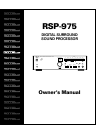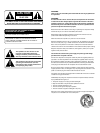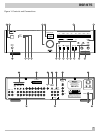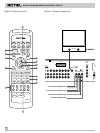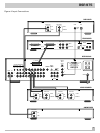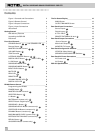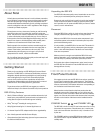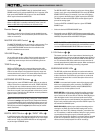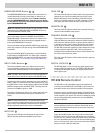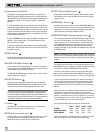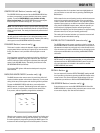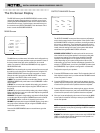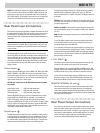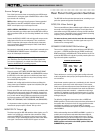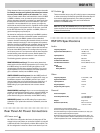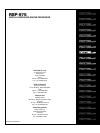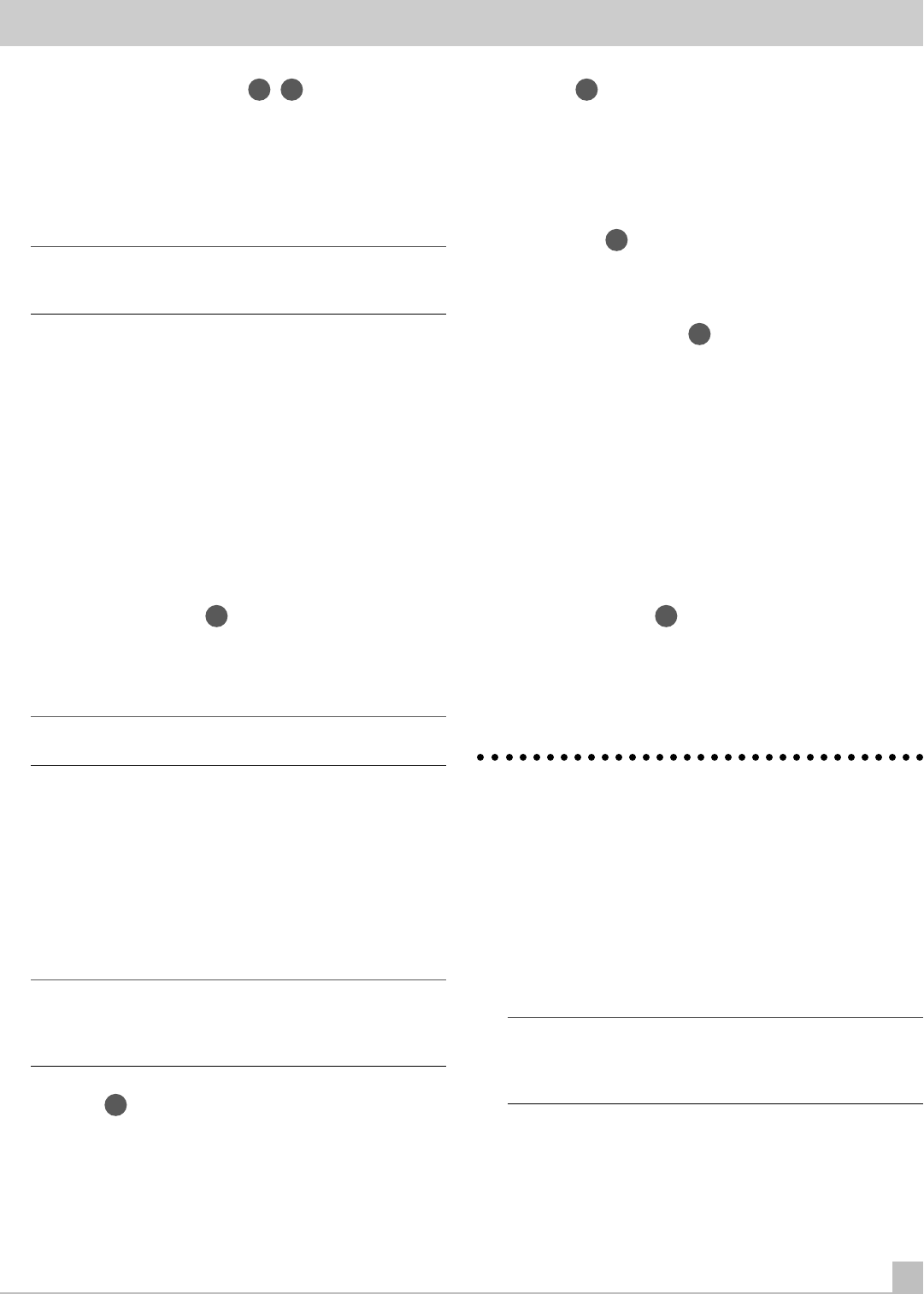
RSP-975
9
SURROUND MODE Button
14
32
The SURROUND MODE button is used to select one of three sur-
round modes (Dolby Pro Logic, Dolby Digital, or Stereo) as de-
scribed in the section immediately above. To make a selection,
press the SURROUND MODE button. Each time you press the but-
ton, the mode will cycle to the next available setting as indicated
by the SURROUND MODE LEDs.
NOTE: If an ANALOG input is selected, the only available surround
mode options are DOLBY PRO LOGIC and STEREO. All three op-
tions are available for DIGITAL inputs.
The surround mode selection for ANALOG inputs (STEREO or
DOLBY PRO LOGIC) is memorized as soon as it is made for each
LISTENING INPUT and will be automatically engaged the next
time that LISTENING INPUT is selected.
The surround mode setting for DIGITAL INPUTS is not memorized
and is only a temporary override as long as that LISTENING INPUT
is activated.
Every time a DIGITAL INPUT is selected, the surround mode set-
ting will default to DOLBY DIGITAL. If a digital signal is detected
that is not DOLBY DIGITAL, the mode will automatically switch to
DOLBY PRO LOGIC. [???? Is this auto-sensing in the RSP-975?]
INPUT LEVEL Buttons
16
These two pushbuttons allow you to adjust the level of each
source component so that the volume level remains relatively
constant when switching between source components.
NOTE: The INPUT LEVEL adjustments only effect the ANALOG in-
put for each source. They have no effect on the DIGITAL inputs.
To reduce the input level of the selected source, press the INPUT
LEVEL < button. To increase the level of the selected source press
the INPUT LEVEL > button. As the setting is adjusted, the VOLUME
DISPLAY changes to show the INPUT LEVEL. The range of the ad-
justment is from 0dB (full gain) to –12dB.
The setting is memorized as soon as it is made so that it will auto-
matically be recalled whenever that source component is se-
lected.
Note: For optimum performance, it is important not to set the
source input levels so high that the signal overloads the RSP-975’s
input circuitry. If the PEAK LED on the front panel is repeatedly
flashing, adjust the input level for that source downward.
MUTE LED
10
This front-panel LED lights to indicate that the output of the
RSP-975 has been muted from handheld remote control.
PEAK LED
9
This front-panel LED lights to indicate that the input signal of the
selected source may be overloading the input circuitry of the
RSP-975. Momentary occasional flashes of this LED on signal
peaks are acceptable. However, if the LED repeatedly or continu-
ously lights, you should reduce the input level for that source.
REMOTE LED
8
This front-panel LED lights to indicate that a command is being re-
ceived from the handheld remote control.
DYNAMIC RANGE LED
6
Today’s digital sources are capable of extremely high dynamic
range (the difference between the softest and loudest sounds). In
some cases, the available dynamic range may tax the amplifiers
or speakers. In other cases, it may be desirable to reduce the dy-
namic range, for example, when listening at low volume levels.
The RSP-975 provides the capability to reduce the dynamic range
in three progressive steps (25% / 50% / 75% reduction) with a
pushbutton on the handheld remote control. See the Remote Con-
trol section of this manual for details.
This front-panel LED lights to indicate that the dynamic range has
been reduced.
DIGITAL LOCK LED
11
The RSP-975 digital circuitry can lock onto digital signals with a
number of different sampling rates. The DIGITAL LOCK LED lights
to indicate that the digital circuitry has recognized and locked
onto a digital signal.
RR-939 Remote Control
The RSP-975 includes a handheld remote control that does far
more than operate the RSP-975. The RR-939 is a full-function pro-
grammable remote control that can operate 8 A/V components.
A separate manual, included with the remote, gives detailed infor-
mation on programming and using the RR-939 to replace all of the
remote controls in your system. This section is intended to provide
only that information which pertains to the use of the RR-939 to
operate the RSP-975.
Note: Many functions duplicate the RSP-975 front panel controls
and are listed here only for your reference. Please refer to the
previous Front Panel Controls section of this manual if you need
additional information.
To operate the RSP-975 with the remote, make sure that the AU-
DIO mode is active by pressing the AUD button on the remote be-
fore you start. If it is active, pressing command keys on the RR-939
will cause the AUDIO button to flash red. Once the AUDIO mode is
active, it will stay active unless you press one of the other DEVICE
buttons to control a different component.



